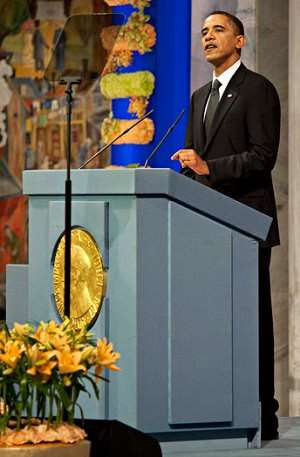Election's Over, Can We Focus on the Wars Now?
Barack Obama tried to extend the war in Iraq, has more troops in Afghanistan than Bush did, and is ordering drone strikes at a dizzying pace.

Is there a charitable interpretation of much of the left's silence about Barack Obama's war policies? Either they don't know about them, they don't care about them or they find building the welfare state a more urgent cause than dismantling the warfare state. Maybe they assume he wouldn't be a Nobel Peace Prize laureate if he weren't a peacemakrer? You can suggest other interpretations in the comments.
Nevertheless, while Barack Obama built a name for himself on his 2002 opposition to the Iraq War (as a state senator out of Hyde Park, Chicago, mind you, where supporting the Iraq War would have been political suicide), he made it clear on the campaign trail he wasn't a non-interventionist. He promised if there was information on Osama bin Laden's whereabouts in Pakistan and the Pakistani government didn't act on it, he would. You couldn't get through the campaign season without hearing at least one Obama booster (or even the president himself) trumpeting that kept promise. Ending the war in Iraq was another promise Obama ran on in 2008. He claims he's kept it and campaigned on ending the Iraq war. Obama, of course, actually tried to renege on the status of forces agreement negotiated under President Bush and extend the war in Iraq.
The war in Afghanistan, meanwhile, continues. There are more troops there now than there were when Obama took office. The president, having opposed the surge in Iraq, ordered one in Afghanistan. Any opportunities for resolution created by the surge, however, were promptly wasted by his government. Afghanistan's grim milestones (2,000th dead U.S. soldier earlier this year) received a lot less attention than such milestones did during Bush's prosecution of the Iraq war. Barack Obama called Afghanistan the good war in 2008, but in 2012 the mission in Afghanistan is as muddled and open-ended as the mission in Iraq ever was.
Yet these two wars, seared into the public consciousness over the last decade, are far from a complete picture of American war abroad in the age of Obama. The president's war in Libya received scant attention during the campaign trail. Congress never approved the action, but never did anything about being ignored either. An ambassador and three other Americans were killed by militants in Benghazi on 9/11, but the incident has been decontextualized from the initial intervention in Libya that very well may have helped lead to it. Though America's intervention in Libya went along unchallenged, there was some measure of debate in Congress about its legitimacy.
Not so for America's drone war, accelerated at an outstanding pace since Barack Obama took office. In Pakistan, where statistics are clearest (though still quite murky, remember, the whole thing is technically a secret), there were about 46 drone strikes in Pakistan from 2004 until the end of the George W. Bush's presidency. Since then, there have been about 288, likely killing more than 2,000 people. (Numbers from the New America Foundation, which undercounts civilian casualties). Most victims of drone strikes are identified as "militants" by the U.S. government. What's a militant? A Muslim male of military age, according to the definition the government uses. The government, led by a president who "cares," even targets rescuers and funerals, under the doctrine that anyone who would come to the aid of or to mourn a militant must be a militant too (you're either with us or against us). Under Obama's auspices, this drone war has extended from Pakistan to include Yemen and Somalia.
Barack Obama's victory Tuesday is being ascribed at least in part to empathy. Maybe he can spare some for these kids:

George W. Bush's critics (many on the left) skewered him for authorizing waterboarding, placing the issue on political center stage in his second term and forcing his apologists to insist it wasn't torture. Barack Obama's war critics so far have numbered much fewer, his apologists preferring to see no evil rather than having to engage or justify it. Here's hoping that changes in the second term.


Show Comments (95)